So I wrote this macro in Rustlang to allow me to create multiple functions fast that accepts a bunch of values and then perform an arithmetic operation (or may be other operations, hence the need for it to remain dynamic enough) on them this way special_fn!(add, 4, i32, +);
Here is the code.
#[macro_export]
macro_rules! special_fn {
($func:ident, $n:expr, $t:ty, $op:tt) => {
pub fn $func(values : Vec<$t>) -> $t{
let mut result:$t;
for x in 1..$n {
result $op= values[x];
}
result
}
};
}
But this line is causing issues result $op= values[x]; and it says Expleced expression, found =

However,
- I could use match expression or if expression to match all possible operations, but that will require more code
- I also found another way is this
macro_rules! special_fn {
($func:ident, $n:expr, $t:ty, $op:tt, $default:expr) => {
pub fn $func(values : Vec<$t>) -> $t{
let mut result:$t = $default;
for x in 1..$n {
result = result $op values[x];
}
result
}
};
}
But this will introduce another metavariable to the macro. Is there another way that will keep the simplicity?